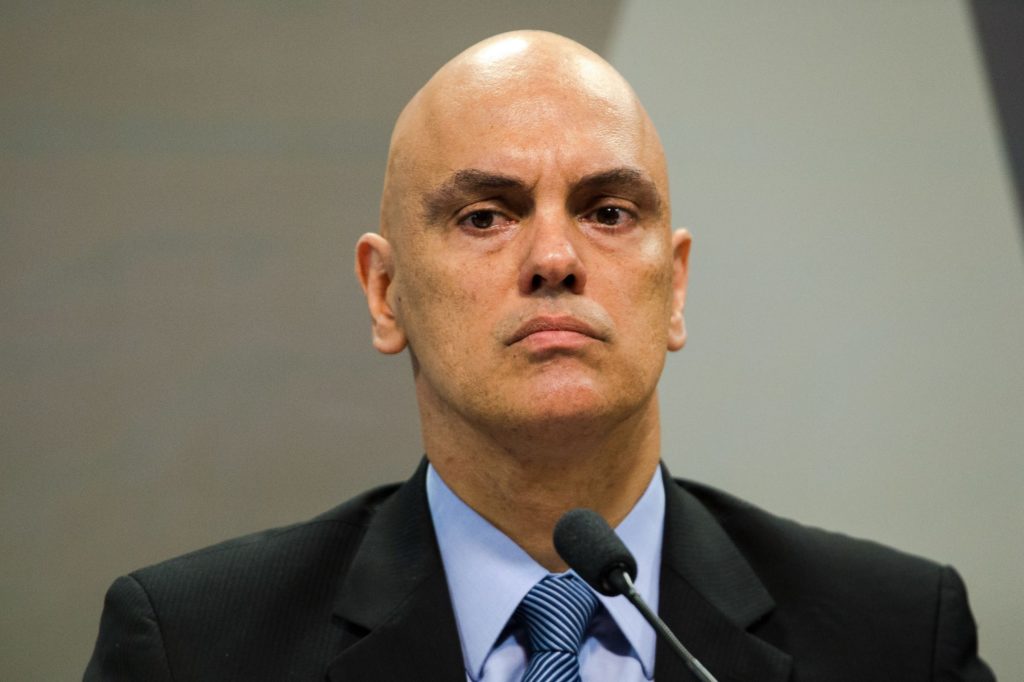RIO DE JANEIRO, BRAZIL – The Bolsonaro government suffered another setback at the hands of the Supreme Court. On Monday night, Supreme Court Justice Alexandre de Moraes granted an injunction sought by opposition parties Rede and PCdoB, that forces the Ministry of Health to restore its prior format of full disclosure of the novel coronavirus pandemic data.

The Ministry, which has been dominated by the military and has had no full Minister since Nelson Teich left, decided on Friday to apply a drastic change to the daily pandemic report, concealing total data on Covid-19 in Brazil. The change was the target of widespread criticism, from Congress to the World Health Organization (W.H.O.), which pressured the Ministry into a partial retreat, as it announced a new platform, not yet made public, even before Moraes’ decision that once again placed the Supreme Court and the Planalto on a collision course.
On Monday, federal Health officials gave a presentation to the press that only intensified the confusion surrounding the issue. The portfolio provided incomplete data: in the consolidated daily balance of the disease, the numbers of at least four states were left out. The figures on how many suspected deaths are still under investigation in the country were also left out. After deferring the report to almost 10 PM throughout last week, the portfolio now says it will be released daily at around 6 PM.
On Monday’s report, official figures showed 15,654 new cases of the disease and 679 deaths in 24 hours, totaling 37,134 deaths by Covid-19 and 707,412 infections in the country. In place of the graph containing all the summarized data, as it had always been doing when updating the website, the Ministry presented the rates in two different locations. When asked, the portfolio accepted that the official figures for June 8th could be higher, since the balance did not include updated data from the States of Alagoas, Santa Catarina, Goiás, and the Federal District.
According to the portfolio, the Health Secretariats had not submitted the information until the report was closed on Monday. “In the case of states that do not send the data in time, we will maintain the numbers of the preceding day,” explained Colonel Élcio Franco, the portfolio’s Executive Secretary, which is still without a Minister.
The ensuing controversies and delays in the release of data led to the creation of a partnership of mainstream media outlets – G1, Globo, Extra, Estadão, Folha de S. Paulo and UOL – to independently monitor the data with the State Health Secretariats. In this survey, which started on Monday, there were 37,312 deaths by Covid-19 and 710,887 confirmed cases. The compilation shows that 849 deaths were reported in the 27 states and 19,631 cases in the past 24 hours.
Death toll
Last Friday, the Ministry had excluded the total number of confirmed cases and deaths by Covid-19 recorded in the country, this must now be reversed after Moraes’ injunction. After the press and other institutions accused the government of lacking transparency, the portfolio temporarily led by Eduardo Pazuello had already stepped back and stated that such consolidated data is available on the Covid-19 panel of the National Council of Health Secretariats (CONASS), fed by the state secretariats, and at Datasus, the National Health System (SUS) data platform. However, the number of deaths still under investigation, data that was previously disclosed on a daily basis, is unavailable on either of the sites; these data are important because the signal the bottleneck in the country’s testing analysis.

The portfolio said – albeit not specifying when – that it will adopt a new disclosure model, based on the date of occurrence of cases (when the patient reports the first symptoms of the disease) and deaths, no longer by the date of their official notification in the system, as had been the case since the start of the pandemic and as been done in virtually every country in the world. As Brazil has not yet managed to implement mass testing strategies, the concern is that the new model will only convert the delay in results into a means of diluting the severity of the pandemic in the country.
“We must ensure active transparency, in detail, of Brazil’s data. This has never happened since 1975,” criticized Wanderson de Oliveira, a former national secretary of health regulation, in a conversation with biologist Átila Iamarino. Oliveira said the Brazilian epidemiological monitoring system was created exactly one year after the dictatorship tried to conceal a meningitis outbreak in 1974. “What kills the fungus is sunlight,” he said.
Scientist Vítor Sudbrack, a physicist who is part of the Covid-19 BR Observatory team, which analyzes data on the pandemic in Brazil, explains that the new methodology implemented by the Ministry can provide a more realistic picture of how the disease behaves in the country, as long as it is performed correctly and with no data concealed. “In most cases, the first symptoms occur 30 days before notification. That’s why it’s good for the government to stick to the death and occurrence dates, because then we have a picture of the real impact of the disease, without the delay in notification, which is arbitrary,” he says.
According to Sudbrack, 61 percent of deaths in some states take more than ten days to be entered into the Ministry of Health’s system. He also explains that the model should provide for automatic correction of previous daily totals, so a death that occurred on June 5th, but which is only recorded after the release of the epidemiological report on June 8th, is still expected to enter the cumulative sum of deaths in the country. “It remains to be seen if this is what the government will actually do,” says Sudbrack, who is skeptical about the “tricks” that Jair Bolsonaro’s administration has used to disclose the pandemic figures.
Sudbrack says that in the SUS’ Sivep-Gripe system, one of the databases used by the Covid-19 BR Observatory, there is also a discrepancy between the national figures and those of the state Health Secretariats. “We saw that the national database has fewer cases than the state ones. In relation to the numbers of the State of São Paulo, there are 50 percent fewer cases in the national database.
We have already asked the Ministry of Health about this change, if any specific filter was applied to the numbers, but we have not had an answer. So all we can do is speculate,” he says. Asked about the matter, the Ministry of Health states that the mistakes in the reports are caused by data “duplication” and that “it has been improving the means for disclosing the national situation of addressing the pandemic”.
“Brazil needs to understand where the virus is, how to control the risks. The W..HO. expects the reporting to be consistent and transparent and understands that the Brazilian government will continue to report daily data on incidence and deaths separately,” said the head of the organization’s emergency program, Mike Ryan, on Monday.
Meanwhile, the internal pressure on the portfolio was also mounting. Senate President Davi Alcolumbre, after a meeting with political leaders, announced that the mixed parliamentary commission that monitors actions to fight the novel coronavirus will now work with figures provided by the state Health Secretariats and not not those published by the Ministry. “It is the role of Congress to seek transparency at such a difficult time for everyone,” he said.
Chamber president Rodrigo Maia had announced on Twitter that he would question interim Minister Pazuello on the disclosure of data in a virtual meeting on Tuesday. Before Moraes’ decision, Antonio Dias Toffoli, STF Presiding Justice, had already joined the critics: “Today we saw the achievement of a cooperative partnership between various media outlets to provide transparency to the pandemic data in the country. Transparency is a constitutional precept. All measures aimed at strengthening it are welcome,” he said.
Source: El País

